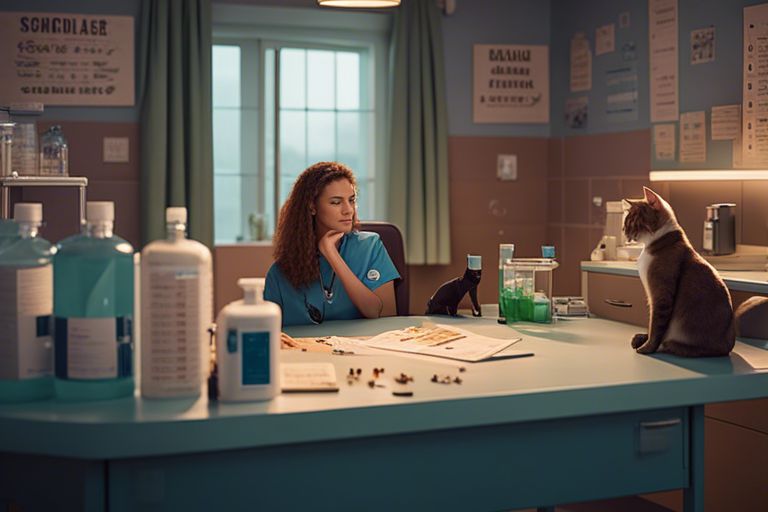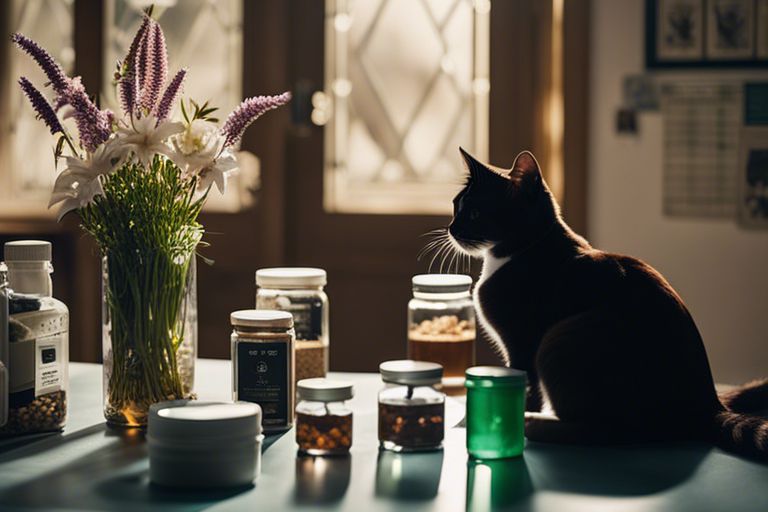Have you ever wondered how to tell if your feline friend has been poisoned? Recognizing the signs of poisoning in cats is crucial for protecting the health and well-being of your pet. Some symptoms of poisoning in cats can be subtle, while others can be more obvious and life-threatening. It’s important to be able to identify these symptoms so that you can take immediate action and get your cat the medical attention they need. In this blog post, we will outline the common and dangerous signs of poisoning in cats, so you can be prepared to act quickly if your pet is ever in danger.
Key Takeaways:
- Vomiting: One of the most common symptoms of poisoning in cats is frequent or persistent vomiting.
- Diarrhea: Another sign of poisoning in cats is diarrhea, which may be accompanied by blood in the stool.
- Difficulty Breathing: Poisoned cats may exhibit labored breathing, wheezing, or coughing as a result of ingesting a toxic substance.
- Weakness: Cats that have been poisoned may appear weak, lethargic, or have difficulty standing or walking.
- Seizures: In severe cases of poisoning, cats may experience seizures, tremors, or loss of consciousness.

Identifying Poisoning in Cats
Some common signs of poisoning in cats include vomiting, diarrhea, seizures, difficulty breathing, and loss of appetite. It is crucial to be aware of these symptoms in order to seek immediate veterinary care for your cat. For a more detailed guide on identifying poisoning in cats, you can visit Cat Poisoned Symptoms | Has My Cat Been Poisoned?
Early Signs of Poisoning
Early signs of poisoning in cats may include drooling, vomiting, disorientation, and lack of coordination. If you notice any of these symptoms in your cat, it is important to take them to the veterinarian right away for treatment.
Advanced Symptoms Indicating Severe Poisoning
Advanced symptoms indicating severe poisoning in cats can include collapse, seizures, coma, and difficulty breathing. These are signs that your cat is in immediate danger, and you should seek emergency veterinary care as soon as possible.
It is important to note that poisoning in cats can be life-threatening, so it is crucial to act quickly if you suspect your cat has been poisoned.
Additionally, never attempt to treat poisoning in cats at home without professional guidance, as some treatments may do more harm than good.
| Early Signs of Poisoning | Advanced Symptoms Indicating Severe Poisoning |
|
|
Types of Poisons Affecting Cats
Assuming you want to keep your cat safe and healthy, it is crucial to be aware of the different types of poisons that can affect them. Here are some common poisons that cats may come into contact with:
| Toxins | Symptoms |
|---|---|
| Household cleaning products | Vomiting, diarrhea, lethargy |
| Human medications | Difficulty breathing, tremors, seizures |
| Plants and flowers | Salivation, lack of appetite, weakness |
| Chemicals like antifreeze | Excessive thirst, vomiting, seizures |
| Outdoor poisons like pesticides | Lack of coordination, tremors, difficulty breathing |
Knowing the symptoms of each type of poison can help you identify the problem quickly and seek appropriate veterinary care for your cat.
Human Foods That Are Toxic to Cats
If you’d like to share a meal with your cat, it’s important to know that there are certain foods that can be toxic to them. Foods such as chocolate, onions, garlic, and grapes can be dangerous for your cat and can cause symptoms such as vomiting, diarrhea, and even organ failure. Make sure to keep these foods out of reach of your cat to prevent any potential poisoning.
Plants and Flowers Dangerous to Feline Health
When it comes to plants and flowers, there are some that can pose a threat to your cat’s health. Plants such as lilies, tulips, and daffodils can be toxic to cats and can cause symptoms such as vomiting, diarrhea, and even kidney failure. It’s important to be cautious and keep these plants out of your cat’s reach to avoid any potential poisoning incidents.
Immediate Actions and First Aid
After recognizing the symptoms of poisoning in your cat, it is crucial to act quickly to prevent further harm. The following immediate actions and first aid can help minimize the effects of poisoning and give your cat the best chance of recovery.
Steps to Take If Poisoning Is Suspected
If you suspect your cat has been poisoned, the first step is to remove them from the source of the poison and place them in a safe, well-ventilated area. Make sure to wear gloves to protect yourself from any potential toxins. Next, try to identify the suspected poison – if it’s a chemical, have the label or name of the substance ready to provide to a veterinarian. Do not attempt to induce vomiting unless instructed to do so by a veterinarian, as this can sometimes do more harm than good. It’s important to act quickly, so contact your veterinarian or the nearest animal poison control hotline for further guidance.
When to Seek Veterinary Care
If you suspect your cat has been poisoned, it is crucial to seek veterinary care immediately. Some poisons can cause life-threatening symptoms that require prompt medical attention. Even if the symptoms seem mild, it’s better to be safe than sorry when it comes to potential poisoning. Your veterinarian will be able to provide the appropriate treatment and support to help your cat recover as quickly as possible.
Prevention and Safety Measures
To ensure the safety and well-being of your feline companion, there are several preventative measures and safety protocols you can implement in your home. By taking a proactive approach, you can minimize the risk of poisoning and create a secure environment for your cat.
Creating a Cat-Safe Environment
When it comes to creating a cat-safe environment, there are a few key principles to keep in mind. First and foremost, eliminate access to toxic substances such as cleaning products, pesticides, medications, and certain houseplants. Store these items in secure cabinets or high shelves that are inaccessible to your cat. Additionally, be mindful of items such as string, dental floss, and small toys that could be ingested and cause harm. By taking these precautions, you can significantly reduce the risk of accidental poisoning in your home.
Regular Monitoring and Controls
Regular monitoring and controls are essential for ensuring your cat’s safety. Make it a habit to inspect your home for potential hazards on a regular basis. Check for any open containers of toxic substances, loose medication pills, or small objects that could be harmful if ingested. Additionally, keep a close eye on your cat’s behavior and habits. Any changes in appetite, energy levels, or unusual symptoms should be promptly addressed with a visit to the veterinarian. By being vigilant and proactive, you can catch any potential risks before they escalate.
What are the symptoms of poisoning in cats?
From above, it is important to be aware of the potential symptoms of poisoning in your cat. If you notice any signs such as vomiting, diarrhea, difficulty breathing, seizures, or loss of appetite, it is crucial to seek immediate veterinary attention. Additionally, keep an eye out for behavioral changes or unexplained lethargy, as these could also be indicators of poisoning. Remember to keep potentially toxic substances out of your cat’s reach and to promptly address any concerning symptoms to ensure the health and safety of your feline companion.
FAQ
Q: What are the common symptoms of poisoning in cats?
A: The symptoms of poisoning in cats can vary depending on the substance ingested, but common signs include vomiting, diarrhea, excessive drooling, difficulty breathing, seizures, lethargy, and loss of appetite. If you suspect your cat has been poisoned, seek immediate veterinary attention.
Q: How can I tell if my cat has been poisoned?
A: If you notice any sudden or unusual changes in your cat’s behavior or appearance, such as disorientation, excessive drooling, weakness, or difficulty breathing, it may indicate poisoning. Other signs to look for include dilated pupils, tremors, and seizures. It’s crucial to act quickly and contact a veterinarian if you suspect poisoning.
Q: What should I do if I suspect my cat has been poisoned?
A: If you suspect your cat has been poisoned, remove them from the source of the poison and contact your veterinarian or an emergency pet hotline immediately. Do not attempt to induce vomiting or administer any home remedies without professional guidance, as this could worsen the situation. Be prepared to provide information about the suspected toxin and any observed symptoms to assist the veterinarian in providing the appropriate treatment. Time is crucial in cases of poisoning, so swift action is essential.

Jayley, a devoted cat enthusiast, also writer for other cat blog as well. She aims to dedicated to providing comprehensive information, insights, and advice on everything you’d ever want to know about our whiskered companions.
